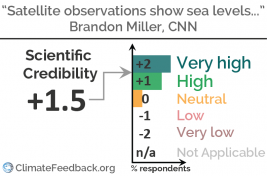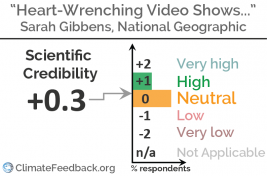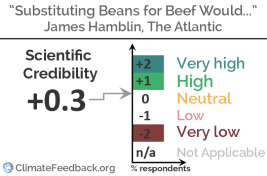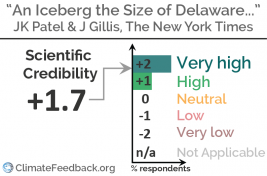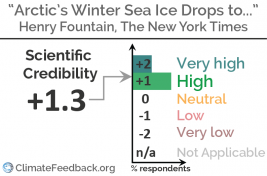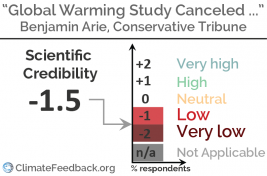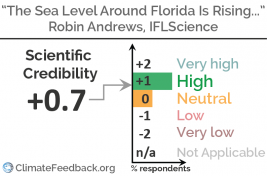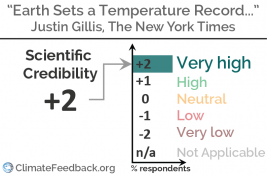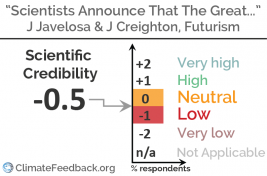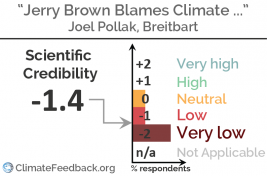Article Reviews
“Is this article consistent with the latest thinking and knowledge in science?”
“Would experts in this field endorse the main message of this article?”
These are the types of questions our “feedbacks” are designed to answer. If the feedback is positive, you can generally assume the information you’re reading is of high credibility. If it’s negative, however, you may want to read with extra care and attention — some of the information contained and conclusions reached are not consistent with science.[1]
New satellite measurements show sea level rise is accelerating, as CNN accurately reports
in CNN, by Brandon Miller
"Global geological sea-level data, data from tide gauge and now satellite data all show that the rate of sea level rise is accelerating. These accelerations in sea level is a cause for great concern."
— 15 Feb 2018
National Geographic video of starving polar bear should have clarified uncertain link to climate change
in National Geographic, by Sarah Gibbens
"The article contains valid information on the devastating consequences of climate change on polar bears. The only problem as I see it is that the article presents (implicitly) that the polar bear in the video is dying as a consequence of climate change and from not finding enough food due to lack of sea ice..."
— 17 Jan 2018
Atlantic story on the climate implications of reduced beef consumption could provide clearer context
in The Atlantic, by James Hamblin
"The article explains the issue (meat production diverts crops from humans to cattle) on a simple level. More explanation and more context could have been provided, I think, regarding individual-level and sectoral sources of greenhouse emissions."
— 17 Jan 2018
New York Times effectively informs readers about large Larsen C iceberg calving event
in The New York Times, by Jugal K. Patel and Justin Gillis
"The article handles a complex topic well. It would be easy to be alarmist with this subject matter, and while its lede edges that way, the main content of the article is very balanced. It also presents a lot of interesting information in a compelling manner."
— 17 Jan 2018
New York Times accurately covers 2017 record low Arctic winter sea ice extent
in The New York Times, by Henry Fountain
"The article accurately reports on the state of Arctic sea ice at the annual maximum (in March) and its causes, and gives an insightful discussion as to the implications. There is one point which may be misleading..."
— 16 Jan 2018
Conservative Tribune post falsely claims cancelled Arctic research cruise is evidence against climate change
in Conservative Tribune, by Benjamin Arie
"Repeating a version of a debunked argument against climate change science, this biased and misleading political article states that the cancellation of an Arctic research cruise due to increased sea ice at one time and in one region proves climate scientists don't know anything about climate change over 100 years, which is patently false."
— 16 Jan 2018
IFLScience story on Florida sea level rise somewhat unclear but generally correct
in IFLScience, by Robin Andrews
"While the information in this article is essentially correct, the links lead to loosely related articles published on the same website, rather than articles that directly support the statements made in the article. The explanation of the acceleration of sea level rise in Florida is oversimplified, probably because it is difficult to summarize concisely."
— 16 Jan 2018
New York Times’ news coverage of 2016 global temperature data was an accurate summary
in The New York Times, by Justin Gillis
"A clear and accurate article on the temperature record in 2016, looking back at the records in 2015 and 2014. The article places them in the proper context of long-term warming, while mentioning the special effect that helped make the year a record."
— 16 Jan 2018
Futurism story on Great Barrier Reef compromised by sensational headline
in Futurism, by June Javelosa and Jolene Creighton
"The content is almost all correct, but the attention-grabbing headline is wrong and isn't supported by the quotes from two scientists or by the rest of the content."
— 16 Jan 2018
Breitbart article on California fires misleads by omitting explanation of climate’s influence
in Breitbart, by Joel Pollak
"The Breitbart article provides a poorly reasoned and misleading view of how climate change has contributed to recent fires in California and the rest of the western USA. The most informative part of the article is the link that it provides to a piece by Southern California Public Radio, which, unlike the Breitbart article, provides an informative and unbiased look at factors contributing to these recent fires."
— 19 Dec 2017
[1] Note: These feedbacks do not constitute endorsements of the author’s political or economic ideology, rather they are assessments of the scientific foundations and reasoning of the argumentation contained within each article.

